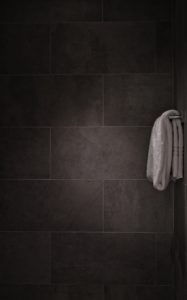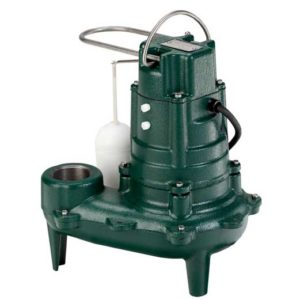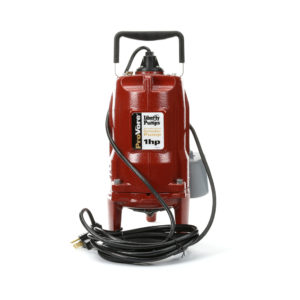
If you’re a landlord and are renting single-family homes, duplexes, or town houses, we tip our hats to you–it’s not an easy job. When you add the need to maintain a septic system on top of the property itself, it’s no surprise that many landlords either have a plumber on standby or are former plumbers themselves. Fortunately, if you choose your sewage pump carefully and make sure it’s a good fit for your rental property, you can considerably reduce the amount of time, effort, and money you need to spend maintaining it. As any successful landlord knows, less time at the property means more money in your pocket. Today we’ll share our suggestions for the best low-maintenance sewage pumps for rental properties. We have similar articles on the best sump pumps for landlord rental properties coming soon.
First of all, do you actually need a sewage pump for your rental property?

The first thing to keep in mind about sewage pumps as a landlord is that you might not actually need one to begin with. If your rental home doesn’t include a septic tank or a below-grade water drain (e.g., a basement shower, bathtub, sink, or toilet), it won’t typically need a sewage pump, as all of your plumbing units will drain by gravity into a discharge leading to your municipal sewage line.
However, if you have any of the aforementioned sources of grey-and black-water below your gravity-drain sewage line, you’re not going to be able to rely on gravity to drain such units into your plumbing discharge, and you’re going to need a sewage pump. Similarly, if your rental property makes use of a septic tank, you’re automatically going to need a sewage pump to pump water into the tank. If either of these scenarios describe you, then you’re naturally going to want to figure out how to set up a sewage pump as cost-efficiently and reliably as possible to reduce the time you spend either working as a part-time plumber or the money you spend getting a plumber on site. The next section deals with how to reduce your expenses in this area while keeping your tenants happy.
If you need a sewage pump, is an ejector pump or a grinder pump better for a rental property?

If you do need a sewage pump for your rental home, the next question to answer will be whether you can save money with an ejector pump or whether you’d be better off spending more for a grinder pump. The answer here is…
it depends.
If you rent a single family home or town home, you can get by with a sewage ejector pump in many situations without problems. If you do have issues, they’ll either come from engineering challenges or tenant compliance. Let’s look at what both of those scenarios involve.
What structural scenarios mean I’ll need an ejector or grinder pump as a landlord?
Engineering or structural issues refer to the distance of the home from a gravity sewage main, the amount of lift you need, or whether the sewage is pumped into a pressurized system. To put it simply, if your rental property is located sufficiently far from a municipal gravity sewer main, you’re going to need a grinder pump because after a certain distance (e.g., 500 feet), an ejector pump isn’t going to be able to pump sewage to the gravity main. Being more powerful, a grinder pump will. Similarly, beyond a certain amount of head (e.g., 25 feet), an ejector pump won’t be able to pump sewage (or anything) vertically, while a grinder pump will. And finally, if you need to pump sewage into a pressurized main, an ejector pump simply won’t have that kind of power, and you’ll need a grinder right off the bat.
What kinds of tenants make getting a grinder vs ejector pump a good idea as a landlord?

The nice thing about structural issues is that they’re rather objective; either you’ve got a gravity main or a pressurized main, for example. Tenant compliance issues are more frustrating because they aren’t black and white and can vary from one property to the next, from one set of tenants to the next, and even within the same set of tenants. Simply put, they refer to the degree to which your tenants actually follow your instructions. If you can trust them to only flush urine, poop, and tissue paper down your toilets, you’ll be just fine with an ejector pump, as most decent models are capable of handling up to 2 inch solids (poop).
However, if your tenants aren’t compliant, they’re going to treat your toilets like trash cans, and that means they’re going to flush all kinds of things down them that can jam your ejector pump’s impellers. We’ve seen all kinds of feminine hygiene products (pads, tampons, etc), underwear, rags, napkins, diaper wipes, diapers (disposable, but occasionally cloth), and even entire towels flushed down toilets, only to clog or jam ejector pump after pump. They don’t clog grinder pumps. If you can’t trust your tenants to be conscientious about this (and even the best tenants can make mistakes or have children or guests who do), you’ll want to save yourself a lot of trouble and just get a grinder pump from the start.
What if I just don’t want to ever call a plumber as a landlord?
If your top priority is avoiding needing to call a plumber or play one on the weekends, the answer is simple: get a sewage grinder pump, and get one from the start. It’ll give you the kind of security you just can’t get from a sewage ejector pump, both in terms of its ability to handle when clients flush things that shouldn’t be flushed and in terms of the extra power it’ll have to handle more complex structural issues without skipping a beat. When you don’t want to worry about whether you can trust the next set of strangers to use your sewage system the way it was meant to be used, and when you don’t want to come over to diagnose one more plumbing issue or pay a plumber to do so, the amount you spend on buying a grinder over an ejector will be insignificantly small in comparison. Take it from us: peace of mind is priceless.
You can read our reviews on a range of recommended sewage pumps here. You can buy the Liberty Pumps PRG101A grinder here on Amazon. You can buy the Zoeller M267 here.
If you find our work at PumpThatSump helpful, you can support our relentless reviewing of every sump pump on the market by shopping via our Amazon link for whatever you need to make your house a home. Despite being self-employed, we promise not to spend it all on health insurance.
